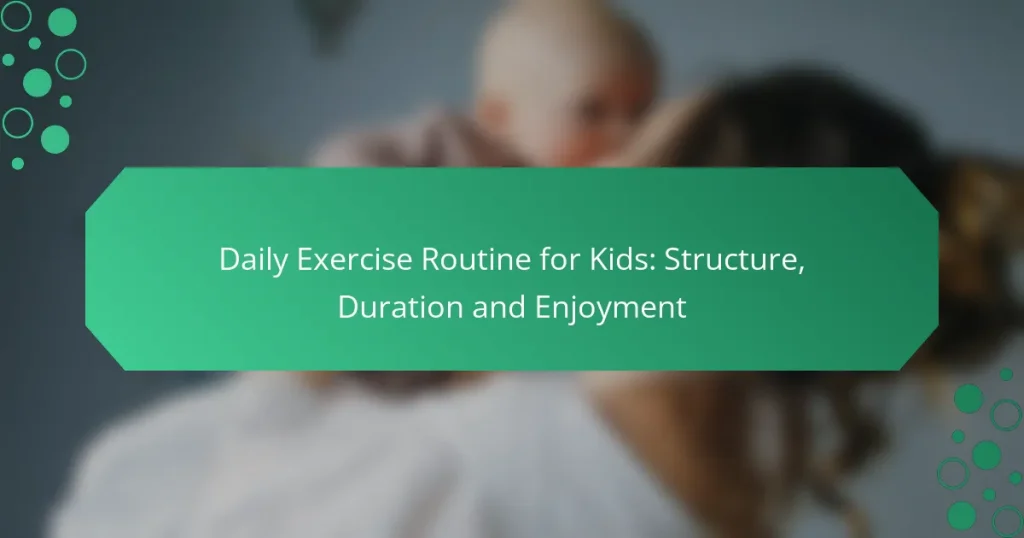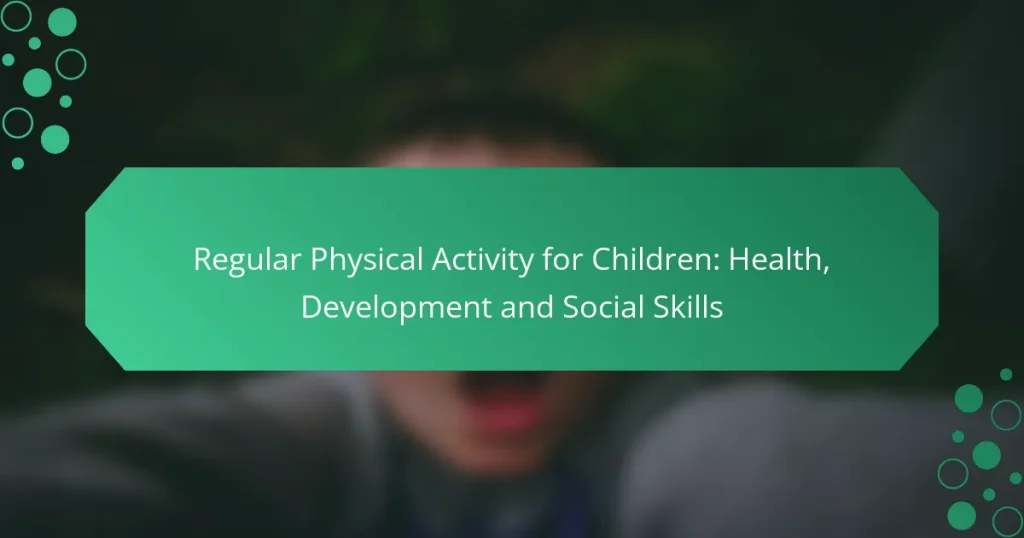Nutrition and wellness are crucial for children's development, with physical activity playing a key role in enhancing their overall health. Engaging in regular exercise not only builds strong bodies but also supports mental well-being and instills lifelong healthy habits. To thrive, kids should aim for at least 60 minutes of varied physical activity each day, incorporating team sports, outdoor play, and structured classes for optimal fitness and social skills development.
How Can Physical Activity Improve Kids' Health?
Physical activity significantly enhances kids' health by promoting overall fitness and well-being. Regular exercise helps develop strong bodies, supports mental health, and fosters healthy habits that can last a lifetime.
Enhances cardiovascular fitness
Engaging in physical activity strengthens the heart and improves blood circulation, which is crucial for cardiovascular fitness. Activities like running, swimming, or cycling can elevate heart rates and enhance endurance.
Encouraging kids to participate in at least 60 minutes of moderate to vigorous exercise daily can lead to better heart health and lower risks of cardiovascular diseases later in life.
Supports healthy weight management
Regular physical activity plays a key role in maintaining a healthy weight for children. It helps burn calories and build muscle, which can prevent obesity and related health issues.
Incorporating fun activities such as dancing, playing sports, or even active playtime can help kids manage their weight effectively while enjoying themselves.
Boosts mental health and mood
Physical activity is linked to improved mental health in children, reducing symptoms of anxiety and depression. Exercise releases endorphins, which are natural mood lifters.
Encouraging kids to engage in group sports or outdoor activities can foster social connections and enhance their overall emotional well-being.
Improves sleep quality
Regular exercise can lead to better sleep quality for children, helping them fall asleep faster and enjoy deeper sleep. Physical activity helps regulate sleep patterns and reduces insomnia symptoms.
To maximize sleep benefits, it's advisable to schedule exercise earlier in the day, as vigorous activity close to bedtime may have the opposite effect.
Strengthens bones and muscles
Physical activity is essential for building strong bones and muscles in children. Weight-bearing exercises, such as jumping or climbing, stimulate bone growth and density.
Encouraging activities that involve resistance, like climbing or playing on playground equipment, can significantly contribute to muscle strength and bone health during critical growth periods.
What Types of Physical Activities Are Best for Kids?
The best physical activities for kids include a mix of team sports, individual pursuits, outdoor play, and structured classes. Each type offers unique benefits that can enhance physical fitness, social skills, and overall well-being.
Team sports like soccer and basketball
Team sports such as soccer and basketball promote teamwork, communication, and social interaction among kids. These activities typically involve regular practice and games, helping children develop coordination and endurance.
Encouraging participation in local leagues or school teams can provide structured environments for kids to engage in these sports. Aim for at least two to three practices or games per week to maximize benefits.
Individual activities such as swimming
Individual activities like swimming allow kids to focus on personal skill development and fitness at their own pace. Swimming is particularly beneficial as it builds strength, flexibility, and cardiovascular health.
Consider enrolling children in swimming lessons or encouraging them to swim recreationally. Aim for sessions of 30 minutes to an hour, several times a week, to enhance their skills and enjoyment.
Outdoor play and exploration
Outdoor play and exploration are essential for children's physical and mental health. Activities like hiking, biking, or simply playing in the park foster creativity and physical fitness while allowing kids to connect with nature.
Encourage unstructured outdoor playtime for at least an hour each day. This can include activities like climbing trees, playing tag, or riding bikes, which help develop motor skills and promote a love for the outdoors.
Structured classes like dance or martial arts
Structured classes such as dance or martial arts provide children with a disciplined approach to physical activity. These classes not only improve fitness but also teach focus, respect, and self-discipline.
Look for local studios or community centers that offer classes suitable for different age groups. Regular attendance, ideally once or twice a week, can help kids build confidence and physical skills while having fun.
How Much Physical Activity Do Kids Need?
Kids need at least 60 minutes of physical activity each day to support their growth, development, and overall health. This activity should be a mix of different types of exercises to promote fitness and well-being.
At least 60 minutes daily
Daily physical activity is crucial for children as it helps maintain a healthy weight, improves cardiovascular fitness, and enhances mental health. Aim for a minimum of 60 minutes of moderate to vigorous activity each day, which can be broken into shorter sessions if needed.
Activities can include playing outside, participating in sports, or even engaging in active play with friends. Consistency is key, so encourage kids to make physical activity a regular part of their routine.
Varying intensity levels recommended
Incorporating varying intensity levels in physical activities is beneficial for kids. This means mixing moderate activities, like brisk walking, with vigorous activities, such as running or playing tag.
Varying intensity not only keeps children engaged but also helps improve their overall fitness. Encourage them to try different sports or games that challenge their endurance and strength.
Incorporate both aerobic and muscle-strengthening activities
A well-rounded fitness routine for kids should include both aerobic and muscle-strengthening activities. Aerobic exercises, such as swimming or cycling, boost heart health and stamina.
Muscle-strengthening activities, like climbing, jumping, or playing on playground equipment, are equally important. Aim for muscle-strengthening exercises at least three times a week to support healthy growth and development.
What Are the Benefits of Active Play for Kids?
Active play offers numerous benefits for kids, including improved physical health, enhanced social interactions, and better cognitive development. Engaging in physical activities helps children build strength, coordination, and confidence while fostering essential life skills.
Encourages social skills development
Active play provides children with opportunities to interact with peers, which is crucial for developing social skills. Through games and group activities, kids learn to communicate, share, and cooperate, laying the groundwork for healthy relationships.
Participating in team sports or group games can help children practice conflict resolution and empathy. For instance, when playing soccer, they must work together to achieve a common goal, which teaches them the importance of teamwork and understanding others' perspectives.
Enhances creativity and imagination
Active play stimulates children's creativity and imagination by allowing them to explore different scenarios and roles. When kids engage in unstructured play, such as building forts or pretending to be superheroes, they exercise their creative thinking and problem-solving skills.
Encouraging imaginative play can involve providing simple props or open spaces where children can create their own games. For example, a few cardboard boxes can transform into a spaceship, promoting both physical activity and creative expression.
Promotes problem-solving abilities
Through active play, children encounter various challenges that require them to think critically and develop solutions. Whether navigating an obstacle course or strategizing in a game, they learn to assess situations and make decisions quickly.
Parents and caregivers can enhance this aspect by introducing games that require strategic thinking, such as capture the flag or scavenger hunts. These activities not only promote physical fitness but also sharpen cognitive skills essential for everyday life.
How Can Parents Encourage Active Lifestyles?
Parents can encourage active lifestyles by actively participating in physical activities with their children and creating an environment that promotes movement. Simple changes in daily routines can significantly increase children's engagement in fitness and play.
Be role models for physical activity
Children often emulate their parents' behaviors, so being a role model for physical activity is crucial. Engage in regular exercise yourself, whether it's jogging, cycling, or participating in sports. When kids see their parents valuing fitness, they are more likely to adopt similar habits.
Incorporate family activities that involve movement, such as hiking or playing sports together. This not only sets a positive example but also strengthens family bonds through shared experiences.
Create a routine that includes active play
Establishing a routine that includes active play helps children understand the importance of regular physical activity. Set aside specific times each day for outdoor play, whether it's after school or on weekends. Consistency is key to making physical activity a natural part of their day.
Consider integrating activities like dancing, playing tag, or riding bikes into your family schedule. Aim for at least an hour of active play most days of the week, as recommended by health guidelines.
Limit screen time and promote outdoor activities
Limiting screen time is essential for encouraging children to engage in more physical activities. Set clear rules about how much time can be spent on devices each day, ideally keeping it to a couple of hours. This helps create space for more active pursuits.
Encourage outdoor activities by organizing playdates in parks, enrolling kids in sports teams, or simply taking family walks. The goal is to make outdoor play a fun and regular part of their lives, fostering a love for movement and exploration.






